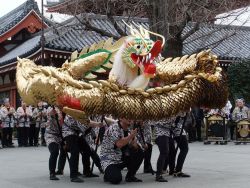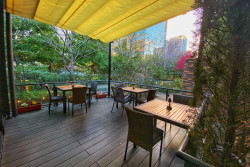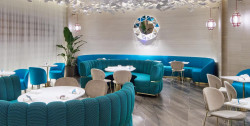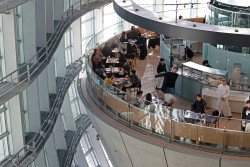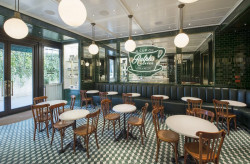
Originally published on metropolis.co.jp on June 2010

Photos Courtesy of La Longevite
It was the window dressing that first lured us into La Longevite. From the outside, it looks like something that Hayao Miyazaki might have dreamt up, all European-style brickwork and striped awnings. The interior is more intriguing still: crimson walls and curtains interspersed with banks of mirrors, with plush booths at either end of a long central counter. After a while, the Miyazaki aura lifts and we realize that it might also pass for a well-preserved cabaret club from the ’70s. That isn’t necessarily a bad thing.
The building was once home to Quiche & Tarte, a well-regarded bistro that closed in 2007 after the owner fell into poor health. Lest the same thing happen again, when the shop was subsequently reborn as La Longevite, it had a new emphasis on food that promoted health and well-being. Chef Sumito Sakurai, a veteran of countless hotel kitchens, sources organic vegetables directly from farms in Yamanashi Prefecture, and the menu reflects a serious interest in nutrition.
None of this actually registered on our first visit, mind you. Like a parent sneaking vegetables into a fussy child’s food, La Longevite manages to make genuinely healthful meals without most diners even realizing it. There’s none of the fussiness of dedicated macrobiotic eateries, and the staff don’t have that pale, anemic look you sometimes see at hardcore vegetarian joints.
The wine list is predominantly French, though it finds space for a few unorthodox inclusions such as the Israeli Yarden Cabernet Sauvignon 2007 (¥6,000/bottle). Glasses start at ¥650 and bottles at ¥2,500, which is cheaper than we’d expect in such lavish surroundings. We get a bottle of Elsa Bianchi Malbec (¥2,500), a fruity Argentinean red that pairs well with our food. Cocktails run from ¥750, and draft Asahi is ¥650. There’s also an intriguing selection of off-menu spirits on a table by the counter, but you’ve probably got to ask nicely if you want to sample them.

The food menu, which changes according to the season, flirts with macrobiotic cuisine without leaving committed carnivores out in the cold. The avocado and lotus root tempura with shoyu and wasabi (¥850) is superb, and we’re impressed by the well-balanced flavors of the roast onion with anchovy sauce (¥750) from the daily specials board. Sakurai also does a decent aji sashimi (¥850), and his tori-teki mock-chicken karaage is disconcertingly authentic (¥750). Vegetarian dishes are clearly marked in the menu, and there are quite a few to choose from.
We’re not overly convinced by the mushroom risotto, made with brown rice and soymilk (¥1,260): it’s good comfort food, but the flavor of genmai overpowers everything else. We might go for the crab and uni risotto (¥2,200) next time. The “perpetual youth and longevity” yakuzen vegetable curry (¥1,580) is a hit, though, and we can practically feel ourselves getting healthier as we wolf it down.
